 On June 22, Advance CTE hosted the third and final event in its three-part June Meeting Series. The day focused on the theme of “Elevate,” and offered knowledge about raising the profile of Career Technical Education (CTE), so that key stakeholders and the public support and engage with the field.
On June 22, Advance CTE hosted the third and final event in its three-part June Meeting Series. The day focused on the theme of “Elevate,” and offered knowledge about raising the profile of Career Technical Education (CTE), so that key stakeholders and the public support and engage with the field.
The opening keynote session, “Breaking Through: Making CTE Resonate in a Noisy World,” was built around the fact that Americans are bombarded with thousands of messages a day, from advertising to social media to the news. That makes it difficult to build awareness of and support for CTE. The session provided insights on how to break through, by becoming expert storytellers, sharpening messaging and speaking directly to the issues that matter most. Panelists included Teresa Valerio Parrot, Principal of TVP Communications; Leslie Slaughter, Executive Advisor to the Office of Career & Technical Education, Kentucky Department of Education; and Kate Kreamer, Deputy Executive Director of Advance CTE.
Two key quotes from the panel included:
-
“Media is looking for good stories, and I can’t think of another time where CTE has had the ability to enhance a number of fundamental aspects of education and change what it can look like. Be prepared to shine!” (Parrot)
-
“Be positive when sharing your work! Media and families want to know the value-add of CTE. Have success stories and contacts on hand to support the state context and impact.” (Kreamer)
The keynote session was followed by content-rich breakouts and discussions to build connections and knowledge. Each breakout session was aligned to one of the five foundational commitments of CTE Without Limits: A Shared Vision for the Future of Career Technical Education.
Breakout highlights included:
“Quality: Maximizing Limited Time for Media Relations” elevated efficient methods to start and sustain meaningful relationships with local and regional media. Expert panelists included national reporters Derricke Dennis, Anchor and National Correspondent for ABC News, and Rebecca Koenig, Editor for EdSurge. Both encouraged attendees to understand the demands on journalists, and be mindful of their workflows when pitching stories.
“People are writing about education and others are writing about the workforce,” Koenig said, “but there is an opportunity to meet in the middle to tell stories about CTE.”
 One practical tip Dennis offered: “Start your email subject line with the words ‘STORY IDEA.’” Something that simple can make him jump right to the email.
One practical tip Dennis offered: “Start your email subject line with the words ‘STORY IDEA.’” Something that simple can make him jump right to the email.
He continued, “Real stories are worth repeating. CTE is really an American story which exists all around us!”
In “Systems Alignment: A View From the Hill: A Federal Policy Update,” attendees heard from an expert panel consisting of Advance CTE’s Policy Advisor, Steve Voytek, Dr. Alisha Hyslop of ACTE and José Miranda of the Associate of Community College Trustees. Topics ranged from current priorities in Congress to the midterm elections.
Two key takeaways from the session included the effort to l extend Pell Grant eligibility to short-term workforce training programs is moving through Congress and there is likely to be an increase in the Perkins Basic State Grant funding.
In the breakout “Equity: Student Voices: What Clicks with Me,” secondary and postsecondary CTE learners shared how they learned about CTE, what it felt like/feels like to be a CTE learner, and barriers to full program participation and success. Panelists included Technology Student Association President Gowri Rangu, 2021-2022 Future Farmers of America Utah state officer Kenadee Stubbs and CTE alumni Kendall Brown from Alabama and Faith Lanzillo from New Hampshire.
The panelists talked about overcoming the obstacles they faced and envisioned what we can do, as state leaders, to diversify and strengthen CTE enrollment.
The panelists agreed that mentorship is essential: they were able to see themselves in career paths through diverse ambassadors, learners and professionals, who helped them choose and stay on a career path. Some shared the obstacles they had to overcome, such as lengthy application processes and difficulty changing programs, but all expressed gratitude for having found a path to a fulfilling and rewarding career.
“Public-Private Partnerships: Centering Equity to Address Our Talent Pipeline Shortages” focused on how industry needs to think differently about how they attract, hire and retain talent. Bridgette Gray and Kate Naranjo, leaders from Opportunity@Work, an organization committed to changing hiring practices across the nation, provided expert insights. Opportunity@Work is a strong advocate for more skills-based hiring practices, a policy construct advocated for in CTE Without Limits. These practices have the benefit of broadening and diversifying the talent pool for the private and public sectors. Recently, the state of Maryland adopted a skills-based hiring strategy and can be a key tool to ensure a more equitable and diverse workforce.
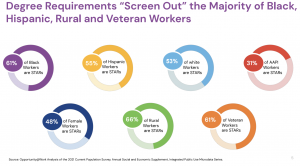 Skill-based hiring promotes hiring based on demonstrated competencies, lived experiences and credentials. Some years ago Advance CTE shifted its language in position description to allow for lived experience equivalency when assessing new candidates and position announcements do not generally list degree requirements.
Skill-based hiring promotes hiring based on demonstrated competencies, lived experiences and credentials. Some years ago Advance CTE shifted its language in position description to allow for lived experience equivalency when assessing new candidates and position announcements do not generally list degree requirements.
“Communicating With Data to Drive Policy and Practices and Inform Stakeholders” rounded out the breakout offerings. The session focused on the story CTE administrators are able to tell with data, which can invoke a sense of urgency in addressing the needs of learners and the economic ecosystem. Panelists included Josie Brunner, Data Strategist in the College, Career and Military Preparation Division at the Texas Education Agency; Scott U’Sellis, Data Manager at the Kentucky Office of Career and Technical Education; and Brennan McMahon Parton, Vice President of Policy and Advocacy at the Data Quality Campaign.
“The average person is not going to go looking for nine different tools,” U’Sellis said. “You need one tool that gives them the answer they want. Ask people, is this interesting data to you, does this help you find what you really want to know?”
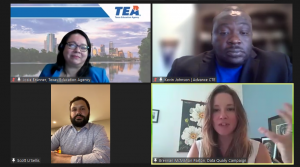 Brunner boldly asserted that the storytelling power of data is full of potential: “We need our data to say to learners that no matter where you are in your career journey, there’s a place for you,” she said.
Brunner boldly asserted that the storytelling power of data is full of potential: “We need our data to say to learners that no matter where you are in your career journey, there’s a place for you,” she said.
Taking a step back, the panelists agreed that there is always a human element to the data, and that’s what can make storytelling so powerful. When looking at data, they noted that it’s easy to forget that data points represent whole people who are so much more than the data that represent them.
Further learning ahead
More than 200 people from across the country tuned in to the three-part June Meeting Series. The event will be complemented by Advance CTE’s Virtual Learning Series, a year-round webinar sequence for the general public and members. We also recently announced our first large in-person gathering since the pandemic started, our Fall Meeting, which will take place in October 2022 (more details coming soon)!
Steve McFarland, Director of Communications and Membership
 I am thrilled to join the Advance CTE team as a communications & advocacy associate. As part of the Communications Team, I will wear many hats, but my work will primarily be federal policy-focused. As part of this work, I will continue and support our weekly Legislative Updates and monthly member-only federal policy events, track federal legislation, and support resource development to connect our members to federal resources related to CTE.
I am thrilled to join the Advance CTE team as a communications & advocacy associate. As part of the Communications Team, I will wear many hats, but my work will primarily be federal policy-focused. As part of this work, I will continue and support our weekly Legislative Updates and monthly member-only federal policy events, track federal legislation, and support resource development to connect our members to federal resources related to CTE. 


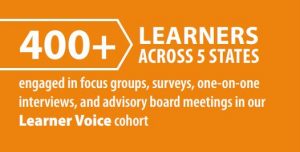 CTE leadership and workforce pipelines, and elevating learner voice. Our members continue to see value in their membership and look for a variety of ways to engage.
CTE leadership and workforce pipelines, and elevating learner voice. Our members continue to see value in their membership and look for a variety of ways to engage.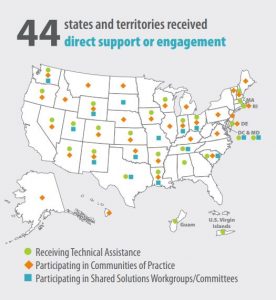 Bringing together our members in person and virtually provides the opportunity to share best practices and lessons learned to address common challenges and improve outcomes for CTE learners. In Spring of 2023 we gathered over 200 CTE leaders to discuss opportunities, challenges, and shared solutions around various topics of the Carl D. Perkins Career and Technical Education Act (Perkins V) in preparation for state plan revisions. Our members were very satisfied with the structure of these meetings, finding it a very useful space to work with their state teams on Perkins processes and gather ideas from their peers. In event evaluation, 100 percent of responding attendees reported that meetings were an “extremely valuable” or “valuable” use of their time.
Bringing together our members in person and virtually provides the opportunity to share best practices and lessons learned to address common challenges and improve outcomes for CTE learners. In Spring of 2023 we gathered over 200 CTE leaders to discuss opportunities, challenges, and shared solutions around various topics of the Carl D. Perkins Career and Technical Education Act (Perkins V) in preparation for state plan revisions. Our members were very satisfied with the structure of these meetings, finding it a very useful space to work with their state teams on Perkins processes and gather ideas from their peers. In event evaluation, 100 percent of responding attendees reported that meetings were an “extremely valuable” or “valuable” use of their time. 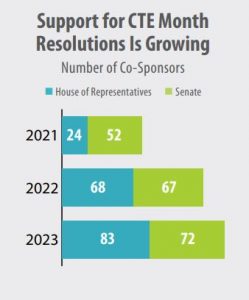

 House Republicans continued to struggle this week to elect a new Speaker of the House. As
House Republicans continued to struggle this week to elect a new Speaker of the House. As  There has been an increasing push within the manufacturing industry to reshore more production back to the U.S. due to recent legislation at the federal and state levels. While there have been policies regarding federal purchasing that require domestic production, such as the Defense Federal Acquisition Regulation Supplement (DFARS), the Buy American Act and recently the Build America Buy America Act, there are now new policies being enacted focused on supporting private sector domestic sourcing. The Creating Helpful Incentives to Produce Semiconductors and Science Act of 2022 (CHIPS and Science ACT) is intended to increase more domestic production of semiconductors, but also to support the growth of new and emerging technologies such as quantum computing, AI, clean energy and nanotechnology. To facilitate this growth, the CHIPS Act authorizes $174 billion over the next five years for STEM programs, workforce development and research and development (R&D).
There has been an increasing push within the manufacturing industry to reshore more production back to the U.S. due to recent legislation at the federal and state levels. While there have been policies regarding federal purchasing that require domestic production, such as the Defense Federal Acquisition Regulation Supplement (DFARS), the Buy American Act and recently the Build America Buy America Act, there are now new policies being enacted focused on supporting private sector domestic sourcing. The Creating Helpful Incentives to Produce Semiconductors and Science Act of 2022 (CHIPS and Science ACT) is intended to increase more domestic production of semiconductors, but also to support the growth of new and emerging technologies such as quantum computing, AI, clean energy and nanotechnology. To facilitate this growth, the CHIPS Act authorizes $174 billion over the next five years for STEM programs, workforce development and research and development (R&D). To maximize’s CTE’s value in reshoring, employers must be informed on its alignment with reshoring-connected careers and be partners in designing CTE programs to meet skills needs. Advance CTE’s employer engagement
To maximize’s CTE’s value in reshoring, employers must be informed on its alignment with reshoring-connected careers and be partners in designing CTE programs to meet skills needs. Advance CTE’s employer engagement  On June 22, Advance CTE hosted the third and final event in its three-part June Meeting Series. The day focused on the theme of “Elevate,” and offered knowledge about raising the profile of Career Technical Education (CTE), so that key stakeholders and the public support and engage with the field.
On June 22, Advance CTE hosted the third and final event in its three-part June Meeting Series. The day focused on the theme of “Elevate,” and offered knowledge about raising the profile of Career Technical Education (CTE), so that key stakeholders and the public support and engage with the field.  One practical tip Dennis offered: “Start your email subject line with the words ‘STORY IDEA.’” Something that simple can make him jump right to the email.
One practical tip Dennis offered: “Start your email subject line with the words ‘STORY IDEA.’” Something that simple can make him jump right to the email. 
